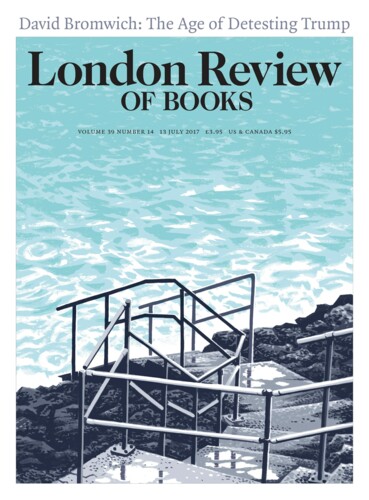The Estonian National Museum is a glass, concrete and steel slope that rises out of the runway at Raadi, a former Soviet air base near the city of Tartu. On a tour of the museum, which opened last year, the guide explained that its design incorporates several features of Estonia’s history. It bridges a stream that once ran through the estate of a Baltic German baron, part of the aristocracy that ruled over a largely Estonian-speaking population for centuries. The former air base is evidence of domination by Moscow: two hundred years under the Russian Empire, a brief period of independence from 1918 to 1939, then reoccupation by the Soviet Union until its break-up in 1991. And the new building, opened several months before Estonia took up the presidency of the Council of the EU, suggests how the country would like to be seen today: bright, open, European, on the up.
Daniel Trilling
Daniel Trilling is the author of Bloody Nasty People: The Rise of Britain’s Far Right.
The genocide memorial in Yerevan, a giant complex built when Armenia was part of the USSR, sits on a ridge overlooking the city: its museum tells of how ethnic Armenians in the final years of Ottoman rule were massacred and forcibly scattered and how the lands claimed by Armenian nationalists were reduced, by military defeat and international diplomacy, to the present-day republic in the South Caucasus. Passengers who leave the metro station at Yerevan’s central square are greeted with a giant map of Greater Armenia, a historical region that mostly falls within the borders of the current republic’s neighbours: Turkey, Iran, Azerbaijan and Georgia. And on the streets, pasted to lamp-posts, walls and junction boxes, are fly-posters offering cheap minibus rides to distant cities: Krasnodar, Rostov, Novosibirsk. The republic’s economy is partly sustained by emigrant workers, most of whom go to Russia.
Should we build a wall around North Wales? The Refugee Crisis
Daniel Trilling, 13 July 2017
All of the pressures that result from international migration are also generated by migration within a country’s borders. Linguistic and cultural differences, scarce public resources, unequal distribution of wealth: all of these exist within as well as between nation-states. So why limit controls to international borders? Why not prevent people from Solihull moving to London and putting pressure on the rental market?
The Documenta festival, a contemporary art exhibition that usually takes place every five years in Kassel, Germany, is currently in Athens. Its presence there isn’t uncontroversial. The role of the art market in gentrification, the festival’s preference for established or dead artists, the spectacle of a wealthy German institution descending on a city that has been at the centre of economic and refugee crises in recent years – all this has drawn criticism. The curators have made some effort to engage with the political context, but not everything has gone to plan: a collaboration between the artist Roger Bernat and an LGBT refugee group foundered when the participants stole the exhibit in protest at what they saw as exploitation.
‘Colonialism as a form of violent foreign rule was legitimised by a racist ideology of European superiority,’ says the board that greets you at the Deutsches Historisches Museum in Berlin. In a slightly too small room, hundreds of objects are laid out in clusters along a line representing the Greenwich Meridian, a ‘symbol of Eurocentrism’ and the anchor for a system that European powers used to navigate, conquer and impose borders on large parts of the world. The objects – carved elephant tusks, commercial images for coffee brands, whips – tell the story of the German Empire.
Podcasts & Videos
Julia Ebner discusses her experiences going undercover in various extremist groups, including White Supremacists, German Neo-Nazis and ‘Trad Wives’, as described in her new book, Going Dark.
Read anywhere with the London Review of Books app, available now from the App Store for Apple devices, Google Play for Android devices and Amazon for your Kindle Fire.
Sign up to our newsletter
For highlights from the latest issue, our archive and the blog, as well as news, events and exclusive promotions.


